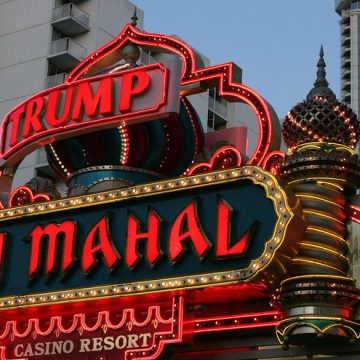
Carl Icahn sold the Trump Taj Mahal for 4-cents on the dollar. That is what stats bourn out by Securities and Exchange Commission documents revealed on Tuesday show.
In March 2017, Carl Icahn sold the Atlantic City casino to Hard Rock International, then grumbled in public releases about being sabotaged local politicians and union leaders.
$1.2 Billion Construction Cost
When Donald Trump opened the Trump Taj Mahal in 1990, it cost $1.2 billion. According to the SEC document, the same property sold for $50 million last month. When one considers the cost of living increases since 1990, the Trump Taj Mahal sold for less than a cent on the dollar.
Hard Rock International is owned by the Seminole Tribe of Florida. The Seminole Tribe is not getting out that inexpensive, since they plan to spend $375 million on a renovation of the Boardwalk casino. That includes a top-to-bottom scrub of all signs of the “Trump” brand from the property, including the onion domes which are supposed to mimic Mughal India architecture, but are reminiscent of the Russian architecture Donald Trump loves so much.
In the new era, The Hard Rock Casino is going to feature American guitars instead of onion domes.
9th Casino in Atlantic City
When the Seminole open their newest casino in late-2017, it will bring the total number of casinos in the city back to nine. 2014 was a particularly bad year for Atlantic City, as four of its twelve casinos closed. The Trump Taj Mahal almost was a fifth casino closure, as it declared bankruptcy late in 2014.
Carl Icahn, the billionaire New York City investor, rescued the Taj from bankruptcy at the last minute. As the largest investor in the property at the time, Icahn had more to lose than anyone from the imminent closure. He loaned $20 million in operating capital to the Trump Taj Mahal, which kept the casino operating throughout much of 2015.
Carl Icahn: Trump Taj Mahal’s Savior
At the time, Icahn seemed to be the savior of the Casino, as he promised to invest $100 million in a much-needed renovation and expansion. The activist investor sparred with union bosses over the health and pension benefits for about one-third of the casino’s staff, but otherwise appeared to be a positive force. Donald and Ivanka Trump praised their family friend, and even came to a licensing deal to keep the Trump name on the property.
Throughout 2015 and the first half of 2016, the casino’s financial picture darkened. When a referendum to place two casinos in North Jersey was placed on the November 2016 ballot for statewide vote, Carl Icahn began to equivocate on the $100 million investment promise. He stated the investment was contingent on New Jerseyans rejecting the North Jersey casino proposal.
Union Woes for Carl Icahn
Then he began to play hardball with the Local 54 of the UNITE-Here casino workers union. The Local 54 represented the cleaning staff and wait staff at the casino. Trump Entertainment Resorts had won a court battle to rescind the union’s health and pension benefits in October 2014, and Carl Icahn was in no mood to give back those hard-won benefits. At the same time, local union boss Bob McDevitt was determined to improve his members’ benefits package through negotiation.
It all came to a head over the Fourth of July Weekend in July 2016. The Local 54 went on strike, closing down the Trump Taj Mahal on the busiest weekend of the year. After three-plus weeks of striking, Carl Icahn announced he would close the casino in October 2016. He blamed the union leader for the closure.
Why Did Carl Icahn Sell the Taj for $50 Million?
New Jersey politicians suspected Carl Icahn wanted to close the Trump Taj Mahal for a time, change its branding, and re-open as a new casino with non-union workers. State Senate Majority Leader Stephen Sweeney passed a bill in both houses of the legislature that retroactively punish anyone who closed down a casino, by stating they would surrender their casino license for 5 years. Though Gov. Chris Christie vetoed the bill, Carl Icahn understood the opposition he would face if he tried any tactics to get around the state’s labor laws.
That is how the Trump Taj Mahal was sold for four-cents-on-the-dollar. Carl Icahn claims he took a $300 million loss on the casino, but that was better than the alternative. Disgustedly, he sold to the Seminole Tribe of Florida, who had wanted to move into the northeastern gaming market for years. Ironically, some speculate that the Seminoles want to own a casino license in New Jersey, in case the state’s residents vote a North Jersey casino bill into law in 2018. If so — and if a North Jersey casino law favored license holders — then their minimal investment could pay off huge dividends.















